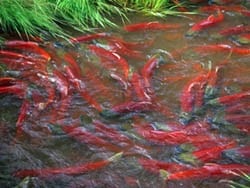Learning to Think Like Salmon

The house we lived in when Lola was born bordered a protected salmon-spawning creek. While I’m certain I had seen it on television or in a film at the science center somewhere, nothing quite prepared me for what it would be like to see spawning salmon in real time.
The creek itself was about twelve feet across and, in the summer and early fall, rarely more than five or six inches deep except for some hidden pockets. Because this is the Pacific Northwest and we take our salmon seriously, there was a 150 foot setback on both sides of the creek that prevented anyone from altering the vegetation even slightly. Both banks were crowded with alder saplings and older maple trees, thick with Himalayan blackberry and stinging nettle and holly that choked out the Oregon grape and ferns. Using his farmboy skills, Bubba whacked a deer path wider for us with a rusty machete handed down from his father so that we could walk out and stick our toes in the thick mud in the summer.
The first October we lived there, I smelled the creek fifty yards before I got there – the rich, sour smell of rotting fish hung in the air like fog. Another ten yards and I could hear splashing but couldn’t conjure a picture in my head of what was causing it. Finally, I stood on a piece of plywood we had laid across two rocks on the bank to keep our shoes clean and gaped.
Hundreds and hundreds of salmon whipped their tails side to side, packed in next to each other so tightly I could have crossed the creek on their backs. The water was so shallow and these fish so large that fully two or more inches of their bodies protruded above the creek. Water sprayed in wide arcs as they frantically pulsed their tail fins to push forward, upstream. Their heads were silvery-grey and their bodies flashed red-orange in the daylight. When I scanned the sides of the creek I saw dozens that had given up the fight and lay dying or dead on the banks. There were a few who had found refuge behind fallen branches, in pockets of deeper water, where they hung out resting before they forged ahead again and I nearly wept in recognition of their fatigue.
There have been times in my life when I was that fish – the one taking a quick breather before heading back into the fray, barely holding on to breath but knowing that there was no going back, if only because there were others behind me that were plowing ahead and I would get in their way. And I have wished for the world to stop for a bit, for the flow of the creek to hit pause so that I could breathe without quickening my pulse, without watching the clock, without steeling myself for the rest of the journey.
In a dream the other night, I had a change of perspective. Instead of being on the outside looking at that fish and empathizing, I was the fish. I was surprised to discover that, instead of dreading what was to come, hanging out in the cool, deep water, I was anxious to continue on. Instead of focusing on the fatigue of swimming upstream against the current, I was excited for the journey towards something, and I felt the solidarity of all my fellow fish in the water. We were all swimming with purpose, certain of where we were going and why, clear in the knowledge that it was bigger than all of us.
The phrase “like a salmon swimming upstream” is forever changed in my mind. And as long as I don’t linger too long on the fact that the salmon all die shortly after completing this journey, when I begin to feel too tired to go on, I can remind myself that I am moving in the direction of something important and kindle the excitement instead of giving in to exhaustion.






Beautiful!